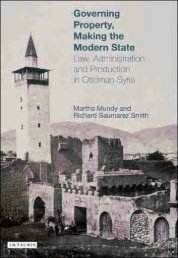The Young Turk Period, 1908-1918 - PSI424
The Young Turk Period, 1908-1918 - PSI424
The Young Turk Period, 1908-1918 - PSI424
You also want an ePaper? Increase the reach of your titles
YUMPU automatically turns print PDFs into web optimized ePapers that Google loves.
314 <strong>The</strong> Rise of Modern <strong>Turk</strong>ey, 1808-1975<br />
from the main war theaters in Europe. <strong>The</strong> Ottomans therefore were to advance<br />
into Egypt and to invade the Caucasus, with an appeal for a Holy War enhancing<br />
their efforts in these campaigns as well as undermining the enemy's ability to<br />
mobilize its forces. Germany also attempted to secure the support of the Iranian<br />
government against Russia, but Russia responded with an occupation of the northern<br />
part of the country (November 1915), forcing the Germans to set up their own<br />
puppet government and army at Kerman§ah. This stimulated the British to reply<br />
along the Persian Gulf in the south, with Sir Percy Sykes leading the South<br />
Persian Rifles, based in Shiraz, which, with some assent from the Tehran government,<br />
prevented the Germans from getting help from the Persian Gulf and so forced<br />
them to depend entirely on what they could get from the Ottomans and von der<br />
Goltz in Iraq.<br />
<strong>The</strong> Ottoman war aims, as elaborated by Enver and his colleagues, were mostly<br />
but not entirely the same as those of the Germans. Enver really hoped to use the<br />
war to regain substantial territory in Macedonia and Thrace as well as in eastern<br />
Anatolia, Egypt, and Cyprus. As his ambitions developed, however, they also came<br />
to include the liberation of the <strong>Turk</strong>ish people of the Caucasus and Central Asia<br />
from Russian and Armenian tyranny, the establishment of the influence of the<br />
sultan-caliph over all other Muslims in the world, particularly those of India, and<br />
the final liberation of the empire from the economic and political domination of all<br />
the powers, including the Germans.<br />
<strong>The</strong> Northeastern Front, 1914-1916<br />
German strategy prevailed at the outset, so that Enver had to concentrate first on<br />
his ambitions in the east. Almost as soon as he became minister of war he began<br />
to strengthen the Third Army, based at Erzurum, which covered the entire area of<br />
northeastern Anatolia from Lake Van to the Black Sea; thus it was ready to attack<br />
almost as soon as war was declared. Enver made a last effort to secure the support<br />
of the sultan's Armenian subjects, but a meeting at Erzurum with Armenian leaders<br />
from Russia as well as the Ottoman Empire was unsuccessful. Russia already had<br />
promised the Armenians an autonomous state including not only the areas under<br />
Russian rule in the Caucasus but also substantial parts of eastern Anatolia.<br />
<strong>The</strong> Armenian leaders told Enver only that they wanted to remain neutral, but<br />
their sympathy for the Russians seemed evident. In fact soon after the meeting<br />
"several prominent Ottoman Armenians, including a former member of parliament,<br />
slipped away to the Caucasus to collaborate with Russian military officials," making<br />
it appear that the Armenians would do everything they could to frustrate Ottoman<br />
military action.<br />
Still Enver decided that the Ottoman security forces were strong enough to prevent<br />
any Armenian sabotage, and preparations were made for a winter assault.<br />
Meanwhile, Czar Nicholas II himself came to the Caucasus to make final plans for<br />
cooperation with the Armenians against the Ottomans, with the president of the<br />
Armenian National Bureau in Tiflis declaring in response:<br />
From all countries Armenians are hurrying to enter the ranks of the glorious<br />
Russian Army, with their blood to serve the victory of Russian arms. . . . Let<br />
the Russian flag wave freely over the Dardanelles and the Bosporus. Let, with<br />
Your will, great Majesty, the peoples remaining under the <strong>Turk</strong>ish yoke receive<br />
freedom. Let the Armenian people of <strong>Turk</strong>ey who have suffered for the












